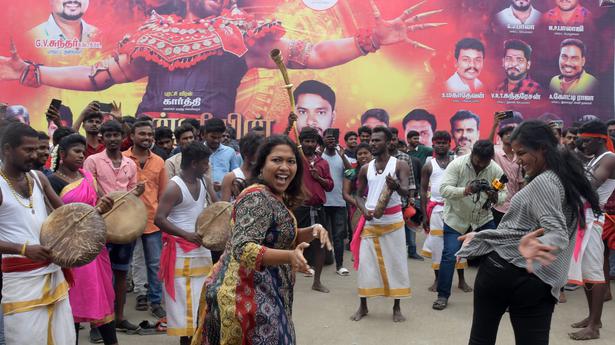The story so far: Pop singer Taylor Swift’s much awaited Eras tour is scheduled to start on March 17, 2023 in the United States. Fans waiting to see their favourite singer perform live, faced a herculean challenge – – booking tickets online. Several users waited long hours to enter the booking phase only to be turned down as tickets were sold out.
Online booking platform Ticketmaster managed ticket sales for Swift’s tour. The company said extraordinary demand and limited supply of tickets caused the problem. Meanwhile fans of the pop star are organising a takedown of the platform even as U.S. Senators discuss plans to break down its monopoly.
(For insights on emerging themes at the intersection of technology, business and policy, subscribe to our tech newsletter Today’s Cache.)
What went wrong with the booking site?
Ticketmaster, the American ticket sale and redistribution company, began the presale of tickets for Taylor Swift’s Eras tour on November 16. The presale was open to Capital One cardholders with queues opening 15 minutes prior to the sale time.
However, users complained of long wait times and outages. There were around 14 million users on the site during the presale rush, and the company sold 2.4 million presale tickets, according to a report by Vox.
Ticketmaster downplayed the problem and said only 15% of the customer interactions experienced problems on its site.
The company stated that there was also a staggering number of bot attacks on their website leading to problems. Ticketmaster further cancelled the sale of tickets for the general public due to high demand and insufficient ticket inventory.
#VerifiedFan is the new ticketing product that Ticketmaster announced as a weapon against bots. Artists can announce presale powered by #VerifiedFan that drives fans to a unique registration page.
This is what we saw during Taylor Swift event where the number of fans outnumbered the expectations during the presale, the company said.
How does Ticketmaster work?
Ticketmaster, owned by Live Nation, relies on fees generated by sale and redistribution of tickets for businesses.
The company controls a majority of artists, venues and the market for tickets in the country. It also has dynamic pricing leading to rush when tickets for highly anticipated events are announced.
“In some instances, events on our platform may have tickets that are “market-priced,” so ticket and fee prices may adjust over time based on demand,” Ticketmaster mentioned on their website.
In the past, the company has faced criticism for its dynamic pricing, as it does not publicise ticket costs before time and prices keep changing based on demand.
Dynamic pricing is influenced by the number of people who are waiting in the queue at a particular moment, and reportedly there were over 2000 people waiting in queue during the pre-sale of the Taylor Swift concert. Users claimed that tickets went for as high as$94,9500, due to this.
Is Ticketmaster new to such controversies?
Last month, Ticketmaster came under the scanner for its ‘dynamic pricing’ during the sale of tickets in concerts by Harry Styles, Coldplay and Blackpink in the U.K., BBC reported.
Ticketmaster claimed on its website that it does not make any money from the face value of a ticket and covers costs from ticket fees alone.
However, with dynamic pricing, the price of tickets often increase to match that of resale tickets which can be a lot higher. The platform also allows verified users to resell tickets that can further influence pricing.
Ticketmaster said that introducing dynamic pricing was important to necessitate the maintenance of the live music industry. Artists and representatives set pricing strategy including fixed and market price points, the report shared.
However, some artists have rejected the dynamic pricing structure to keep costs low for fans.
Critics of dynamic pricing state that artists can control touting, reselling of tickets, by introducing checks like identification at the time of entry to the venue.
Founded in 1976, Ticketmaster has also faced criticism in recent years for its acquisition of competitors like Ticketron, TicketWeb, Musictoday and TicketsNow that led to it becoming one of the biggest tickets selling online platforms.
In 2010 when Live Nation and Ticketmaster merged, officials said that it would encourage competition and send ticket prices down.
Why are US Senators discussing Ticketmaster?
The chaos due to the Taylor Swift Eras Tour attracted the attention of US congressmen reigniting the debate that arose during its 2010 merger. Tennessee’s attorney general, Jonathan Skrmetti, said he will launch a consumer protection investigation on the company after his office was bombarded with complaints from Swift fans.
Senators are demanding action to “break the monopoly of Live Nation and Ticketmaster”.
Senators Richard Blumenthal, Amy Klobuchar, and Ed Markey in a letter to the DOJ wrote that “Live Nation has continued to abuse its dominant market position notwithstanding two prior consent decrees, we urge the Department to consider unwinding the Ticketmaster-Live Nation merger and breaking up the company”, Bloomberg reported.
Congresswoman Alexandria Ocasio-Cortez also criticised TicketMaster and its parent company Live Nation. “Daily reminder that Ticketmaster is a monopoly, its merger with Live Nation should never have been approved, and they need to be reined in,” she tweeted. “Break them up.”
The company, however, has denied any anti-competitive practices.
“The high fees, site disruptions and cancellations that customers experienced shows how Ticketmaster’s dominant market position means the company does not face any pressure to continually innovate and improve. We will hold a hearing on how consolidation in the live entertainment and ticketing industry harms customers and artists alike,” said Senator Amy Klobucher, chair of the Senate’s antitrust panel.
How do online ticket booking platforms work?
Online booking system allows users to self-book and pay through the website for events.
Online platforms work digitally on codes using programming languages like Java PHP and Python to develop online ticketing gateways.
While some of the popular ticketing platforms like Ticketmaster and BookMyShow allow users with accounts to purchase tickets, they may put restrictions like invite-only tickets for certain events.
Invites for special events may be shared through emails and SMS services.
The parameters for invite or closed group-based ticketing usually depends on organisers and criterion for sales may be left to platforms as well.
While most online ticketing platforms only facilitate the purchase and booking of tickets, platforms like Ticketmaster also allow users to resell purchased tickets.






